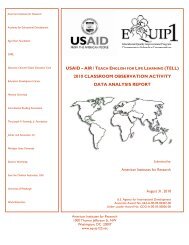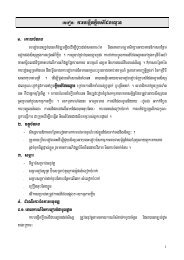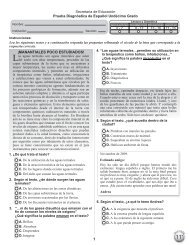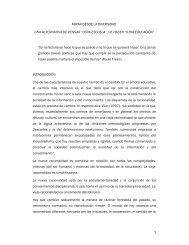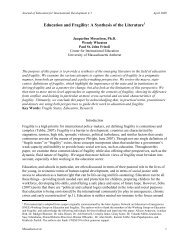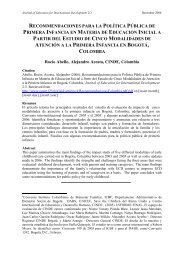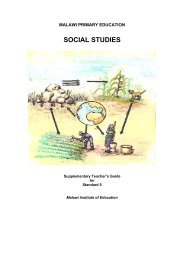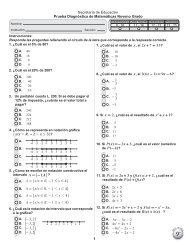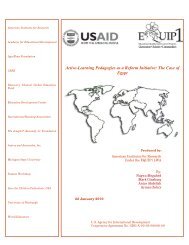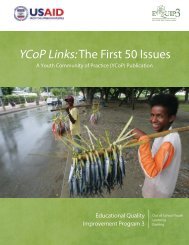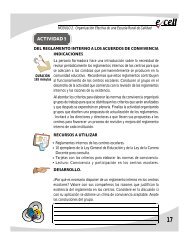The Power of Persistence: Education System ... - EQUIP123.net
The Power of Persistence: Education System ... - EQUIP123.net
The Power of Persistence: Education System ... - EQUIP123.net
You also want an ePaper? Increase the reach of your titles
YUMPU automatically turns print PDFs into web optimized ePapers that Google loves.
USAID support for hands-on assistance in implementing SIP/SSA in Namibian<br />
schools, financial support for creating the advisory teacher position, and intensive<br />
facilitation <strong>of</strong> pr<strong>of</strong>essional reflection opportunities were an essential part <strong>of</strong> the<br />
success <strong>of</strong> the program.<br />
In Egypt, UNICEF support for Community Schools project, and USAID support<br />
for the New Schools was invested for years before conditions were conducive for<br />
policy engagement. Once conditions were favorable, the proven and documented<br />
success <strong>of</strong> these initiatives was an important factor in policy dialogue. Moreover,<br />
USAID’s support for the Alexandria Pilot Project and for the <strong>Education</strong> Reform<br />
Program built on these models and added a stronger focus on policy dialogue and<br />
system capacity building.<br />
Project governance structures and management procedures play a key role<br />
in developing country leadership and ownership, establishing trust, building<br />
capacity, and facilitating continuous improvement practices. Whether at<br />
the national planning level, such as a SWAp, or at project or local levels,<br />
participatory governance structures require a degree <strong>of</strong> flexibility in donor<br />
management that is sometimes antithetical to a strict focus on project<br />
performance and deliverables. <strong>The</strong> more effective projects in terms <strong>of</strong><br />
promoting sustainable reform <strong>of</strong> the education system have been those that<br />
adapted to opportunities, and were responsive to government concerns within<br />
the context <strong>of</strong> dialogue and negotiations.<br />
<strong>The</strong> major accomplishments <strong>of</strong> Namibia’s program to integrate pr<strong>of</strong>essional<br />
development in school improvement planning, self-assessment, circuit support,<br />
and on-site training were not part <strong>of</strong> the original design.<br />
With the arrival <strong>of</strong> a reform-minded Minister and development <strong>of</strong> a<br />
comprehensive plan, the <strong>Education</strong> Reform Program in Egypt was restructured to<br />
address new and unanticipated areas <strong>of</strong> support.<br />
In El Salvador, the opportunities created by the Presidential Commission greatly<br />
expanded a small project activity. <strong>The</strong> ability <strong>of</strong> USAID to maintain a primary<br />
focus on objectives, rather than initially defined activities and deliverables, was<br />
essential to successful implementation.<br />
Developing the trust needed for participatory governance requires that<br />
donor agencies and their agents recognize their lack <strong>of</strong> convening power, and<br />
acknowledge the recipients’ insight into the complexity <strong>of</strong> national political and<br />
institutional issues. <strong>The</strong> sine qua non <strong>of</strong> genuine country ownership requires<br />
donors to cede some authority and accept that the essential donor function is to<br />
enable countries to solve their own problems.<br />
SECTION 3: SUMMARY fINdINGS ANd CONClUSIONS<br />
147



